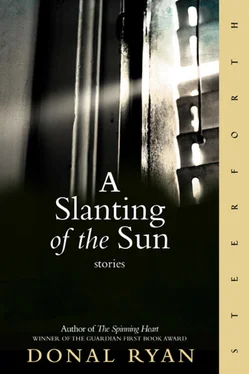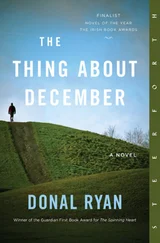There’s a kind of a peace now in the knowing of the routes I have lying stretched away before me, only two of them, and they as clear as if they were drawn in black marker on a white page, with my present life a dot in the fork of their meeting. One is death and one is life. I’ll call up to Bobby Mahon and ask to see will he take me back on for six more months and I’ll sign up for my final block release inside in Limerick and once I have my papers got I’ll ask her to come away with me to Canada or New Zealand or one of them places and if she says Yes I’ll never be sad a day again and if she says No I’ll never be sad a day again and I’ll take my chances with that Lord God above of supposed infinite mercy and my mother and father will be relieved for once and for all of the burden of the worry of me. Someday soon I’ll lean across and kiss her on her lips and there’ll surely then be no going back from that and all that went before will just be dust.
I RENTED A house for a year one time on the very edge of a village, and I made friends by dint of passing up and down with a man who lived on a smallholding down the road. I was meant to be writing a book but I wasn’t able, and so I walked, and waited for the words to come back to me. I’d been paid an advance, and the weight of expectation attached to it had crippled me.
Tommy was up on eighty, I’d say, though he never spoke of his age. He was sprightly and lean, and he had most of his hair, and he kept it carefully combed, and he tried never to show me his pain, but I felt it. And he told me things in fits and starts, across an ancient table, in the kitchen of the cottage his grandfather built.
He was an only child, an exotic thing in the time of his youth, a thing to be speculated about, suspicious of. His parents hadn’t met before their wedding day. It had all been arranged as a favour. A man met his father the evening before he got married, as he wheeled his bicycle up the long hill on his way home from town, a borrowed suit folded on his carrier.
You’re getting wed tomorrow, I hear?
I am.
Who is she?
I don’t know. They calls her Lorrie.
They stayed married for fifty years and died not a week apart. But that story did the rounds for generations. They calls her Lorrie , men would say, stretching out his mother’s name, and they’d roar with laughter. Tommy would overhear the telling of it the odd time and his insides would burn and the backs of his eyes would prickle and he’d picture his mother and father and their quiet fondness, their easy love for one another. Was it an accident, he wondered, how they loved one another? Or was it God put them together, or whatever power is there behind the blueness of the sky and the blankness of eternity? Signs on there’s plenty talk of mysteries in the church.
He was sent to board with the Christian Brothers. His father could just about manage the fees. There was no talk in the gospels about Jesus Christ beating children with sticks. There’s talk of a devil, though, and he crossed paths with him more than once. There was one man used to rock back on his heels to get the full of the weight of his body into the swing of his leather strap and when he was doing it there was a light blazed in his eyes that was something beyond anger. Something not fully human. They sent the worst of them away off to the missions. Men that’d break bones with hurleys and have parents up in arms. Brothers that weren’t circumspect enough about the subjects of their ministrations. A solicitor’s son had a rib broke one time and the nephew of a monsignor had strips of flesh lifted from the palms of his hands. Men that would behave that way to the children of quality were a danger and were sent away to hot places to see would the heat sap some of their fury. Fire, though, could hardly be expected to tame the devil.
His mother used to tell him a story he loved about an aunt of hers who refused one day to stand aside at a stile for Earl Monroe and his squire, as they processed down from their estate to the village. I’ll stand aside for Our Lord, if our paths ever meet, she told them, and was fired the next day from her job in the big house. She only laughed into their faces, and went to America, and married a man who organized boxing matches, and she helped him, and took over from him when he died, and became rich, and ended up a kind of an aristocrat herself.
He’d had a friend he called Moon. They’d fallen out in their boyhood and never fully made up. Moon wouldn’t step in here to this house the way you do, he told me, and sit down there and drink a sup of tea. Moon was from big land, from a swanky crowd. I often met Moon on the road at the cross before Tommy’s. He’d lay a cold eye on me as he passed on his bicycle, straight-backed and stately, and the odd day Tommy would be keeping an eye out for me from his garden gate and I’d hear them exchange terse comments on the weather. And Tommy would show me caricatures he’d drawn of Moon with a steady and skilful hand and he’d say, Look how stupid Moon looks in this picture. Have you ever seen anyone the like of Moon? And I’d allow that I hadn’t, and he’d shake his head in mock sadness and crumple his picture and fling it into the grate. For fear at all, he’d say, and nod towards the door and wink at me.
When the Griffins were all gone, his neighbours one time on the far side from me, their house and bit of land fell to a cousin from town who set it and sold the cottage to a quare crowd. Jehovah’s Witnesses. They came to his door one time and frightened him with their litany of certitudes. The things that were going to happen him, and not one thing he could do to save himself unless he was born again. Lord God, he said to them. Bad enough to have been born the once. But he hadn’t the heart to run them all the same.
There was a woman he’d have liked to marry but he knew no way to cover the ground between them and nor did she.
He read a thing in a book one time about a tribe in Africa who considered themselves the rightful owners of all the cattle in the world. He thought often about them: at the mart, in the meadow, foddering the cattle he was guardian not owner of in the unknowable minds of those lean, dark, nearly naked herders. He imagined himself going to where they lived, to their plain of sand-grass and prickly bushes, circled by jungles and low hills. What would they make of him, if he rose white-faced and wellington-booted out of the undergrowth into the light of their campfire? Would they laugh at him, or welcome him, thank him for fattening their Friesians half a world away, call him Brother? Would they kill him? There now would be a death. Speared, bleeding out beneath a white hot sun. Turned quickly to carrion, flesh torn from bone by savage jaws and scything beaks. His sun-bleached skull saved to adorn a secret temple wall. He’d melt back to molecules in the bellies of beasts and be spread with their spoor across the savannah, along their ancient trails.
He said, Wouldn’t that be a glorious exequy? And I was startled to quietness by the word, by his words, by the talk out of him. He said that they’d insist on burying him here, as of course they would, and incanting around his corpse, and a few words would be said beforehand and none of them truly meant, and neighbours would fidget and think about other things. And he’d only fill the bellies of worms, he’d only enrich the earth around his grave, in the hollow sunless corner of Kilscannell Cemetery where his mother and father were lowered down and covered over by silent men.
He kept a hawk once that he had found by a river on the edge of death. The wrist of its wing was too pronounced and there were balls of light shot in the mantle of it. He straightened and set the wrist of the hawk’s wing with an elastic band and a strip of cardboard and plucked the shot out with tweezers and fed it bits of raw chicken and sat still and silent for days and nights with the hawk perched on his hand. The arm of an old coat he’d fashioned and sewed and used on his hand in place of the leather glove used by professionals. He tamed it by instinct and by echoes of memories of things told to him in childhood; he knew to be still, to hood the bird between meals so it would associate the sight of him with food, to gradually show the bird the world, perched all the while on his hand. He flew the hawk free when it had the full of its health back and his heart thumped until it looped around against the sun and swooped back to him. It lived with him for seven years, in the back kitchen on a stout perch he’d made from boughs of oak where it would meet his eyes sometimes and hold them, and tell him in its dark silence all the things about the world that could be known by a bird of prey, and tell him that it loved him, pure and perfect. The hawk flew in one summer evening wet with blood, full of shotgun pellets, and died. It had come back to him to see could he save it again, and he couldn’t, and his breath went from him, and his reason for a time, and the world tilted a bit and never fully righted.
Читать дальше












